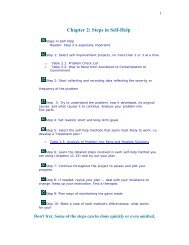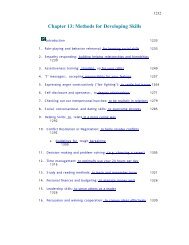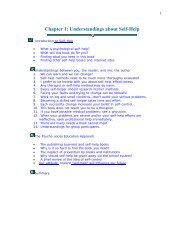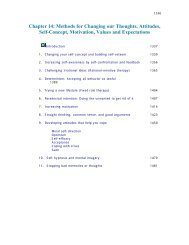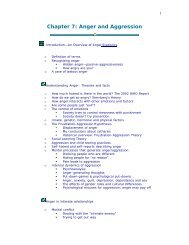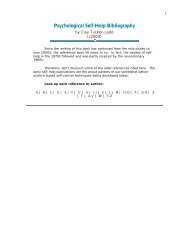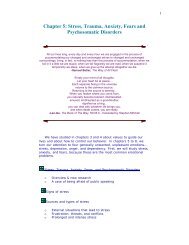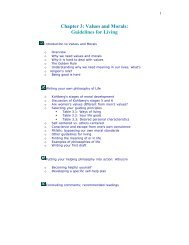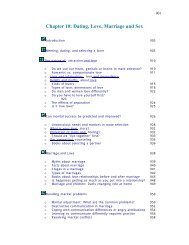Methods for Changing Behaviors - Psychological Self-Help
Methods for Changing Behaviors - Psychological Self-Help
Methods for Changing Behaviors - Psychological Self-Help
You also want an ePaper? Increase the reach of your titles
YUMPU automatically turns print PDFs into web optimized ePapers that Google loves.
3. Learn skills and methods of reducing unpleasant emotions that<br />
bother us, such as fear, guilt, chronic stress, self-criticism, etc.<br />
Examples: Anxiety about our work can often be reduced by<br />
doing extra work and preparing better. Gradually confronting<br />
and challenging your shyness rather than avoiding social<br />
interaction can reduce the discom<strong>for</strong>t as well as alter the course<br />
of your life. See chapters 5 to 9 <strong>for</strong> more in<strong>for</strong>mation.<br />
4. Make a rule that something bad will happen if the desired<br />
behavior doesn't occur as you want it to. Examples: "If I don't<br />
do the dishes, I pay $2.00" or "If I swear, I give $5.00 extra to<br />
the church (or to the KKK)" or "If I eat dessert, I have to run 2<br />
miles." If you can't impose the rules on yourself, ask your<br />
friends <strong>for</strong> help: e.g. if you tend to be late, ask friends to get<br />
mad at you and only wait 5 minutes. If you fail to do your<br />
clearly-defined share of the "dirty work," arrange to have<br />
friends give away your favorite clothes or records.<br />
5. Becoming more aware of the feelings of others may provide the<br />
motivation you need to do the desired behavior. Suppose your<br />
boy/girlfriend told you that he/she is bothered by your being a<br />
"C" student (or really dislikes a habit of yours), wouldn't that be<br />
motivating? You now have a chance to make reasonable selfimprovements<br />
and avoid stress between you.<br />
STEP FOUR: Try out your new plan and see how it works.<br />
This may involve a contract (as in the last method), such as<br />
agreeing to try a new way to get out of a disagreeable situation,<br />
setting a fine <strong>for</strong> certain actions, increasing self-dissatisfaction that can<br />
be avoided, etc. Try to arrange the relief from the unpleasant stimulus<br />
immediately following the desired behavior.<br />
Time involved<br />
Devising and practicing a better avoidance or escape mechanism<br />
may take an hour or two. As with positive rein<strong>for</strong>cement, it may take a<br />
few minutes every day <strong>for</strong> several weeks to carry out a contract to<br />
rein<strong>for</strong>ce certain behaviors in this way.<br />
Common problems with the method<br />
Breaking the rules is the most common--"I just sort of <strong>for</strong>got."<br />
Also, many people realize that they might break the rule so they avoid<br />
making an agreement that has serious consequences. When this<br />
happens, ask if you are serious about changing. Very few people will<br />
raise their own level of dissatisfaction; the rationalizations and excuses<br />
we use pay off so highly. But if you are serious about changing, you<br />
will probably want to set serious penalties <strong>for</strong> failing to do what you<br />
want to do.<br />
Effectiveness, advantages and dangers<br />
1139



